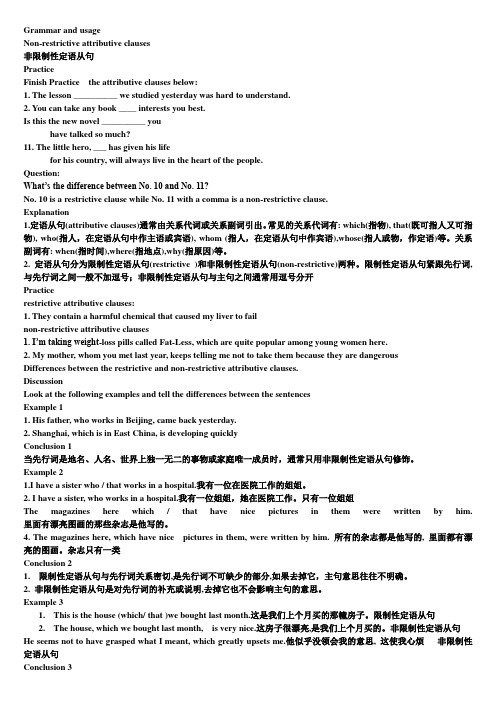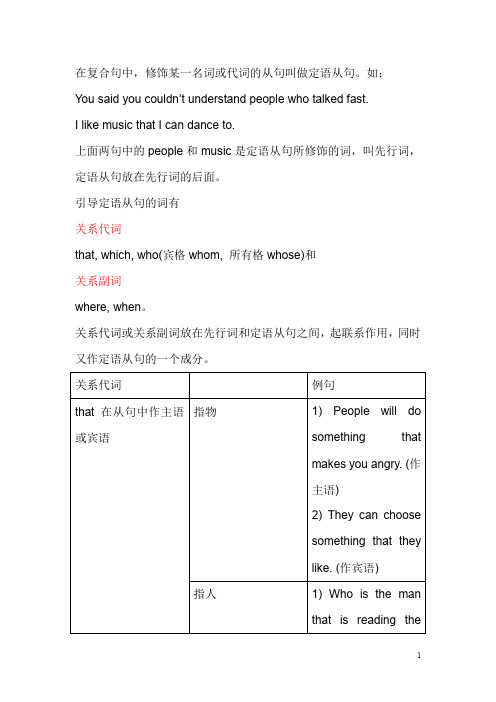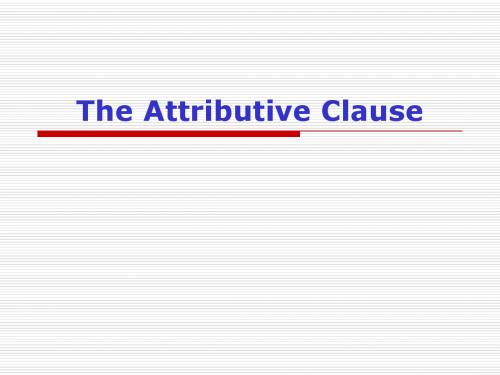Attributive clause test
- 格式:doc
- 大小:22.00 KB
- 文档页数:2


Revision of the attributive clause请写出定语从句的,并完成下列表格.定语从句的基本结构是+ + 定语从句基础知识回顾: 关系词及其意义总指代人指代事物结所属关系指地点归指时间指原因纳请补充完整下列定语从句. 并分小组讨论各组题的考点与难点.Group11) Do you have anything you don’t understand.2) The only thing we can do is to give you some advice.3) Who is the man is standing there ?4) She heard a terrible noise, brought her heart into her mouth.Group 21 Do you know the boy your mother is talking?2.I still remember the day I first got to Paris.3. He gave me some novels I am not very familiar.4 He gave me some novels I am .not very familiar with.5译: 这是我要照顾的小孩.6. I recognized the boss in company my sister was working.7. I was given three books on cooking, the first I really enjoyed.A . of thatB of which C. that D. whichGroup 31.It is such a big stone nobody can lift.2.It is such a big stone nobody can lift it.3 is known to all, he is the best student.4.Jim passed the driving test, surprised everybody in the office.5. He is such a lazy man nobody wants to work withA. as; himB. that ;/ C as; / D whom ; him6. Mrs Black took the police back to place she witnessed the robberA. the same; asB. the same; whereC. the same; that D as the same; asGroup 4翻译1.I have come to the point where I can’t stand him.2. The country is in the situation where a war will break out at any time.3. We are trying to reach a point both sides will sit down togetherand talk.4- Do you have anything to say for yourself?- Yes, there’s one point we must insist on.Group 51. This is the library I borrowed the book.2. It is from the library I borrowed the book.3 - where did you last see Mr.Smith?- It was in the hotel I lived.4. We all have heard the news our team won5. We don’t believe in the news he told us yesterday.Task 2 exercises1.women drink more than two cups of coffee a day have a greater chanceof having heart disease than those don’t.2.In an hour, we can travel to places would have taken our ancestors days to reach.3 . Look out! Don’t get too close to the house roof is under repair.4. All is needed is a supply of oil.5. Finally, the thief handed everything he had stolen to the police.6.All the passengers and suitcases were still waiting on the broken-down old bus had to be transferred to another long-distance bus.7. Her sister has become a lawyer, she wanted to be.8 Luckily, we’d brought a road map without we would have lost our way.9. We are living in an age many things are done on computer.10. Do you still remember the chicken farm we visited three months age?11. The reason she didn’t get the job was that her English was not very good.12. I don’t like the way you speak to her.13. Jim passed the driving test, surprised everybody in the office14. is reported in the newspaper, talks between the two countries are making progress.15. She was educated at beijing university, she went on to have her advanced study abroad.16. The factory produces half a million pairs of shoes every year, 80%are sold abroad.17. These houses are sold at such a low price people expected.18. I’ll never forget the five days we spent on the seaside with you.19. I’ll never forget the days we lived in that village with you.20. I don’t remember the place I put my key.定语从句运用Our class is a big family . It consists of 12 girls and 50 boys. Most of them are mainly from the countryside. Zhao Qiang is a kind-hearted boy. He is always ready to help others. He is such a good boy that we all like him.动词ingExercise:1. It ‘s wise to have some money (put) away for old age2.When I caught him (cheat) me, I stopped buying things.3.They are going to have the service man (install) the fan in the office tomorrow4.His remarks left me (wonder) about his real purpose.5.You will see this product (advertise) wherever you go.6.I will soon get your car (go) again.7.With the work (finish), they hurried back home for lunch.8.The thief ran down the road with a dog (run) after him.9.With a lot of work (do),we had to be busy doing day and night.10.He raised his voice in order to make himself (hear) by the audience.11.They found the house (break) into the next morning.12.We find it easy (get) along with him.13.What he sad drove me (疯狂)。

Grammar and usageNon-restrictive attributive clauses非限制性定语从句PracticeFinish Practice the attributive clauses below:1. The lesson __________ we studied yesterday was hard to understand.2. You can take any book ____ interests you best.Is this the new novel __________ youhave talked so much?11. The little hero, ___ has given his lifefor his country, will always live in the heart of the people.Question:What’s the difference between No. 10 and No. 11?No. 10 is a restrictive clause while No. 11 with a comma is a non-restrictive clause.Explanation1.定语从句(attributive clauses)通常由关系代词或关系副词引出。
常见的关系代词有: which(指物), that(既可指人又可指物), who(指人,在定语从句中作主语或宾语), whom (指人,在定语从句中作宾语),whose(指人或物,作定语)等。
关系副词有: when(指时间),where(指地点),why(指原因)等。
2. 定语从句分为限制性定语从句(restrictive )和非限制性定语从句(non-restrictive)两种。
限制性定语从句紧跟先行词,与先行词之间一般不加逗号;非限制性定语从句与主句之间通常用逗号分开Practicerestrictive attributive clauses:1. They contain a harmful chemical that caused my liver to failnon-restrictive attributive clauses1. I’m taking weight-loss pills called Fat-Less, which are quite popular among young women here.2. My mother, whom you met last year, keeps telling me not to take them because they are dangerousDifferences between the restrictive and non-restrictive attributive clauses.DiscussionLook at the following examples and tell the differences between the sentencesExample 11. His father, who works in Beijing, came back yesterday.2. Shanghai, which is in East China, is developing quicklyConclusion 1当先行词是地名、人名、世界上独一无二的事物或家庭唯一成员时,通常只用非限制性定语从句修饰。

Attributive ClauseIntroductionAn attributive clause, also known as an adjective clause, is a dependent clause that functions as an adjective by modifying a noun or pronoun in the main clause of a sentence. It provides additional information about the noun or pronoun it modifies.Structure of an Attributive ClauseAn attributive clause consists of a relative pronoun or relative adverb followed by a subject and a predicate. The relative pronouns commonly used in attributive clauses are:1.Who/Whom - used for people2.Which - used for things3.That - used for both people and thingsThe relative adverbs commonly used in attributive clauses are:1.Where - used to describe a place2.When - used to describe a timeExamplesHere are some examples of sentences with attributive clauses:1.The boy who is wearing a blue shirt is my friend.2.The car that I just bought is red.3.The book which is on the shelf is mine.4.This is the town where I was born.5.I remember the day when we first met.Functions of Attributive ClausesAttributive clauses serve several functions in a sentence:1. Providing additional informationAttributive clauses provide additional information about the noun or pronoun they modify. They give details, descriptions, or explanations that help in identifying or understanding the noun or pronoun.2. Restricting or limiting the meaningAttributive clauses can restrict or limit the meaning of a noun or pronoun. They specify particular characteristics or qualities that distinguish the noun or pronoun from others.3. Combining sentencesAttributive clauses can also be used to combine two or more sentences into a single, more concise sentence. They allow the writer to provide related information without making the sentence too long or repetitive.Placement of Attributive ClausesAttributive clauses can be placed directly after the noun or pronoun they modify, or they can be placed elsewhere in the sentence for emphasis. The placement of the attributive clause may affect the meaning or tone of the sentence.1. Placement after the noun or pronounWhen the attributive clause is placed immediately after the noun or pronoun, it is called a “peripheral attributive clause.” This is the most common placement for attributive clauses.Example: - The girl who won the competition is my sister.2. Placement before the noun or pronounWhen the attributive clause is placed before the noun or pronoun, it is called a “central attributive clause.” This placement emphasizes the information in the attributive clause.Example: - Who won the competition, the girl is my sister.3. Placement within the sentenceAttributive clauses can also be placed within the sentence for emphasis or stylistic reasons. This placement separates the attributive clause from the noun or pronoun it modifies.Example: - The girl, who won the competition, is my sister.Punctuation of Attributive ClausesThe punctuation used in attributive clauses depends on the placement and structure of the clause. Here are some guidelines for punctuating attributive clauses:1. CommasCommas are used to separate attributive clauses from the rest of the sentence when they are placed after the noun or pronoun.Example: - The book, which was published last year, is a bestseller.2. No commasNo commas are used when the attributive clause is essential to the sentence and restricts or limits the meaning of the noun or pronoun.Example: - The book that I am reading is very interesting.3. Parentheses or dashesIn some cases, parentheses or dashes can be used instead of commas to set off the attributive clause. This is often done to create a stronger separation between the attributive clause and the main clause.Example: - The car (which is parked outside) belongs to my neighbor.ConclusionAttributive clauses play a crucial role in providing additional information, restricting meaning, and combining sentences. Understandingthe structure, functions, placement, and punctuation of attributive clauses can greatly enhance one’s ability to write clear, concise, and grammatically correct sentences.。

在复合句中,修饰某一名词或代词的从句叫做定语从句。
如:You said you couldn’t understand people who talked fast.I like music that I can dance to.上面两句中的people和music是定语从句所修饰的词,叫先行词,定语从句放在先行词的后面。
引导定语从句的词有关系代词that, which, who(宾格whom, 所有格whose)和关系副词where, when。
关系代词或关系副词放在先行词和定语从句之间,起联系作用,同时又作定语从句的一个成分。
OVER●关系代词that, which, who, whom, whose引导的定语从句that 在从句中作主语或宾语A plane is a machine that can fly. (that 在从句中作主语)The noodles (that) I cooked were delicious. (作宾语)Who is the man that is reading a book over there? (作主语)Tell your partner about things that are the same and different between you and a member of your family or a friend.The girl (that) we saw yesterday was Jim’s sister. (作宾语)*She lives in a house that she built herself out of trash. (作宾语)The lessons that he taught were not easily forgotten. (他所教的课不易被忘记。
)Everywhere that Mary goes, the lamb is sure to go. (儿歌歌词)which在从句中作主语或宾语They planted some trees which didn’t need much water. (作主语) The fish (which) we bought this morning were not fresh. (作宾语)who, whom在从句中分别作主语或宾语The foreigner who visited our class yesterday is from Canada. (作主语)The boy who broke the window is called Tom. (作主语)(应该可以改为The person whom (whom这里应该可以省略) you you just talked to is Mr. Li.)Mrs Read is the person to whom you should write. (作宾语)(=Mrs Read is the person whom(whom这里应该可以省略) you should write to.)whose和它所修饰的名词在定语从句中可作主语及动词或介词的宾语用作名词的限定语;whose引导的定语从句既可为限制性的,也可为非限制性的。

Unit 10 Attributive ClausesOf various English subordinate clauses, the attributive clause is perhaps the most complicated and therefore it always poses a hard nut for the translator to crack. This is either because of the disparity between English and Chinese syntax or because of their habitual modes of expressing the same idea in different ways. And here are some instances from the above Practical Translation Training:▪The saga of the White Star Liner Titanic, which struck an iceberg and sank on its maiden voyage in 1912…▪白星公司班轮泰坦尼克号在1912年的处女航中因撞上冰山而沉没的传闻轶事……▪… the railings where doomed passengers and crew members stood…▪那些惨遭厄运的乘客和船员曾站过的栏杆旁……▪…Marine Geologist Robert Ballard, 44, who led the teams from the Woods Hole Oceanographic Institution that found the Titanic last September…▪……44岁的海洋地质学家罗伯特﹒巴拉德领导德伍兹霍尔海洋研究所科学探险队,该队于去年9月发现了泰坦尼克号……▪… the 300-ft. gash that, according to legend, was torn in the Titanic’s hull▪……传说中泰坦尼克船体上那条划破长达300英尺的裂缝▪…the stern, which settled on the bottom almost 1,800 ft. from the bow, had swiveled 180 on its way down.▪……船尾在下沉时旋转了180度,在海底距船首几乎有1800英尺远。
Attributive clause test
用适当的关系代词或关系副词填空。
1.The person_______ farm we rent like to gossip about
the neighbors.
2.Vitamin C, _______ some people consider a defense
against the common cold, is inexpensive.
3.Our faithful dog, _______ we all dearly loved, died
last week at the age of 10.
4.Prof.Black, _______is here for a conference, will be
the guest speaker in my history class today.
5.John is the man ______ I expect to win.
6.After our first English class _______ everyone
complained about, I am not looking forward to the second.
7.The driver of the bus _______ I take to work knows
all of his passengers by name.
8.My favorite teacher _______ is very good at playing
basketball will be leaving at the end of the term.
9.The showers _______ the weather bureau(气象局)
had predicted never came.
10.The very girl ______ painted the picture must be a
genius.
11.Jack ______ we think is important to our school
will leave for Beijing tomorrow morning.
12.America is a developed country, _______ we all
know.
13.Have you forgotten the same story_______ she is
telling?
14.I will remember the days________ we spent
together last summer.
15.I will remember the days________ we studied in
the university.
16.We are talking about the art and the artist _______
had been present at the exhibition.
17.I will tell all ________ like English very much to
come to the English evening.
18.Mary, ________ I think is the best student of my
class, is studying in the library.
19._______ is natural, she won the first prize in the
painting contest.
20.I hope to buy an apartment _______ I can live a
comfortable life.。